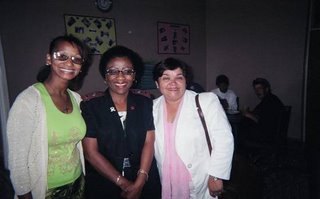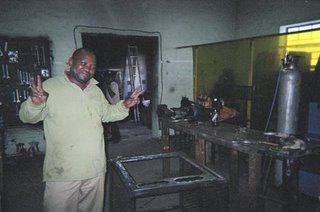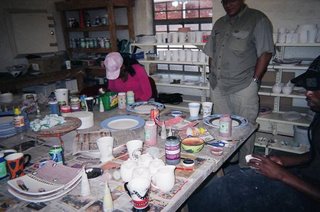World AIDS Day 2006
 Accountability
AccountabilityStop AIDS: Keep the Promise.
Today the world commemorates the 19th anniversary of World AIDS Day. Over 40 million people worldwide are living with the disease, while another 25 million have already died from it. While India has the highest prevalence of HIV/AIDS infections in the world, two thirds of all new infections are happening on the continent of Africa. The Western media today will show the annual patronizing pictures of hopeless people dying from AIDS and wrangle about developed countries and pharmaceuticals not giving enough aid to those suffering from HIV/AIDS. Global Wire recently went to South Africa and met with people who are not dying from AIDS, but rather living with pride and dignity. Those who are infected and affected are finding new ways of fighting the disease. Here are their stories:
Treatment Action Campaign
We met with Luyanda Ngonyana, the executive director of the Johannesburg office of Treatment Action Campaign (TAC), which is an AIDS activist organization founded by HIV activist Zackie Achmat in 1998. Achmat is a middle class Indian man who is HIV positive himself. He stopped taking anti-retrovirals because he felt that it was unfair that the vast majority of poor black South Africans don’t have access to these same medications. He will not take anti-retrovirals until everyone has access to them. TAC is unique for combining the issue-specific targeted direct action tactics of American AIDS groups like ACT UP with the culture and organization of the South African trade union and anti-apartheid movements. Over five million people in South Africa are infected with HIV/AIDS. There are over 1,000 new infections every day. TAC advocates for medicine for those living with HIV/AIDS through community mobilization. TAC has a long, bitter history with the South African government. TAC first confronted the South African government for not ensuring that mother-to-child-transmission (MTCT) prevention was available to pregnant mothers. It won this case on the basis of the South African constitutional guarantee of the right to health care, and the government was ordered to provide MTCT programs in public clinics. TAC also assisted the government by defending it in the case brought against the government by the pharmaceutical industry. TAC entered the case as an amicus curiae, submitting a brief in favor of the government's position. Although the withdrawal of the pharmaceutical companies from this case resulted in a government victory, the government showed no interest in providing access to the generic antiretroviral medications that its victory allowed. TAC is against President Thabo Mbeki’s view that HIV didn’t cause AIDS and that AIDS medicines were more toxic than helpful, inviting so-called "AIDS dissidents" to advise his government. TAC is working on the dismissal of Minister of Health Dr. Manto Tshabalala-Msimang, who has failed to address the HIV pandemic correctly. She is known for advocating natural remedies such as garlic and lemons for AIDS treatment instead of antiretrovirals. During the closing ceremonies of the International AIDS conference in Toronto last August, United Nations Special Envoy for HIV/AIDS in Africa Stephen Lewis pointed out the failure of South Africa's response to HIV/AIDS, calling their actions more "worthy of a lunatic fringe than of a concerned and compassionate state." He also announced that earlier in the morning, Zackie Achmat and 44 others had been arrested for occupying provincial offices in Cape Town in protest of government's failure to treat prisoners with anti-retrovirals, and in particular the recent death of one plaintiff in the legal case against the government on this matter.
AIDS Law Project
We met with Cloe, Thabo and Chelsea of the AIDS Law Project (ALP) in Johannesburg. It is an organization that specializes in helping people with HIV/AIDS to deal with legal problems. They also research many of the difficult social, legal and human rights issues around AIDS. They use this research to develop law, policies and "best practice" recommendations on questions such as AIDS and employment, AIDS and pregnancy, AIDS and development, AIDS and women. ALP is the only organization in Africa that works exclusively to promote equal rights and justice for people with HIV. ALP researchers, attorneys and paralegal officers speak at over 250 meetings a year on a range of topics about AIDS, development, employment, human rights and the law. They are currently working on cases relating to prisoners’ rights, AIDS orphans and both male and female rape victims. Most of the cases they see are from people with HIV who are being harassed or torture by family and friends because of their HIV status. ALP has challenged the US government on its ABC (abstinence, be faithful, use condoms) policy, as they feel that it doesn’t take into account the lack of women’s empowerment and the legacy of apartheid that has left a lasting effect on South Africa.
Men As Partners
We met with William Letswalo in Soweto, coordinator for Men As Partners (MAP). MAP is a program of EngenderHealth that tries to get men involved in helping to reduce HIV transmission and gender violence. Around the world, women carry disproportionate responsibility for reproductive health and family size. And while women receive the bulk of reproductive health education, including family planning information, gender dynamics can render women powerless to make decisions. Men often hold decision-making power over matters as basic as sexual relations and when and whether to have a child or even seek health care. But most reproductive health programs focus exclusively on women. Letswalo recognizes the importance of partnership between women and men, as well as the crucial need to reach out to men with services and education that enable them to share in the responsibility for reproductive health and stop domestic violence. Letswalo says that he tries to be an example to other men in the community, by taking turns cooking and cleaning with his wife. Letswalo says that he has gotten a negative response from other men about MAP because many African men feel that their “culture” is being subverted be being equal to women. “Being a real man doesn’t mean you have to beat your wife and children and force your wife to have sex,” Letswalo said. “Being a real man means that you take care of your family.”
Art Addressing Reality

We visited the Credo Mutwa Cultural Village, where we met a sculptor named Philip who did sculptures about women’s empowerment. Many of the sculptures run on themes such as rape, incest, female circumcision and HIV transmission. “We need to change how men view women,” Philip said. “Women need to fight back this disease.”
Grassroots Community Development and Mobilization

We meet with Matilda Vantura (on the right in the white coat), an MP for the Western Cape Provincial Parliament. She showed us around her constituency to see the different development projects she is involved in.
We went to a paralegal office where they provide legal services for low-income community members, many of whom are people living with HIV.
We then went to Tehillah Multipurpose Center. This is a shelter for abused and homeless, young women and their children. Most of the residents are HIV positive and most of the children are products of incest or rape. This shelter tries to provide a second chance for this vulnerable population by having skills-training workshops, such as sewing and silk screening.
We visited Gugu S’Theba, a community development program cosponsored by Microsoft that provides training for those with HIV so they can enter the workforce such as carpentry and pottery design.




0 Comments:
Post a Comment
<< Home